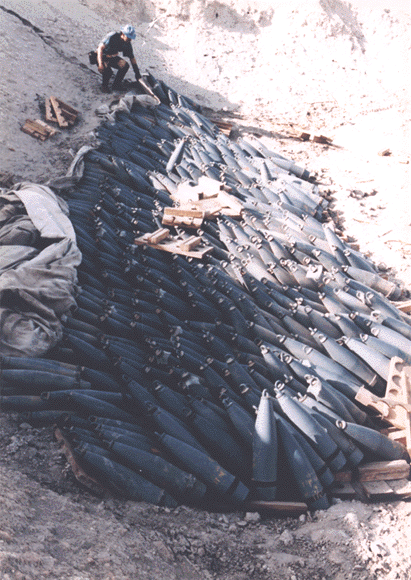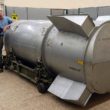Editor’s Note: In April 2015, The Washington Spectator published investigative reporter Barbara Koeppel’s account of a cover-up in which Defense Department (DOD) officials refused to admit that veterans of the 1991 Gulf War were exposed to sarin gas when they blew up Saddam Hussein’s chemical weapons bunkers at Khamisiyah.
Koeppel reported that despite veterans’ personal accounts, and DOD and CIA documents, Pentagon officials did not admit until 1997 that troops “may” have been exposed.
Also they claimed they didn’t know who was exposed and that exposure levels were too low to cause illness.
Early this month, Ron Brown, a Gulf War veteran disabled by sarin exposure in 1991, and a source for Koeppel’s story, met with Acting Assistant Secretary of Defense Brad Carson.
Koeppel’s account follows. —L.D.
Washington, D.C.
Brown—one of the 20,000 troops exposed to sarin at Khamisiyah—hoped Carson would help the veterans get disability benefits, since 70 percent of claims have been denied. Brown told Carson that the veterans have trouble proving their illnesses—such as brain cancer and neurological diseases—are linked to the exposures.
Brown received a follow-up letter from Carson on May 9.
Carson wrote: “The Department took exceptional efforts after Operation Desert Storm to find evidence of exposures … and we agree that Service members attempted to destroy chemical warfare munitions by demolition at Khamisiyah.”
“We didn’t ‘attempt’ to destroy them. We did,” Brown said, adding that in 1996 and 1997, a Presidential Advisory Committee (PAC) and the United Nations Special Commission (UNSCOM) verified the demolitions.
And the DOD testified it blew up 8.5 cubic metric tons of munitions that spewed out sarin at Khamisiyah’s Bunker 73 on March 4, 1991, and several hundred sarin-filled 122mm rockets on March 10 at nearby pits.
“How can he say may have been exposed?” Ron Brown asks. “The DOD knew!”
Carson repeats the line the DOD wrote to Desert Storm veterans in 2000: that investigations “to determine possible hazard areas created by the demolition,” identified service members “who may have been exposed to very low levels of chemical agents after the demolition” (italics added).
“How can he say may have been exposed?” Brown asks. “The DOD knew!”
Brown states that a DOD study listed the exact symptoms the troops reported after they were exposed, where they were located (for example, in the desert), if they were under the plume (the smoke from the demolitions), and what treatment they received.
[Click here to read PDF document showing the DOD knew troops were ill.]
Carson concludes the DOD “cannot confirm exposure, only the possibility of exposure.”
Brown says documents prove that 20,000 troops were within 15 kilometers of Khamisiyah—listing the names of the eight units—while about 80,000 more were within 50 kilometers.
“You don’t have to know the exact dose,” he says. “The PAC confirmed they were exposed. Today, the veterans who were closest are dying of brain cancer at two to three times the rate of those who were further away.”
Last, Carson writes that a DOD 2000 letter advised veterans that “if you had health concerns, which might be related to your Gulf War service, you were encouraged to enroll in the Department of Defense Clinical Evaluation Program, or the Department of Veterans Affairs (VA) Persian Gulf Registry. The VA’s Gulf Registry is still available.”
Brown says many took up the offer.
“When we enrolled in the DOD program, it asked about 15 minutes worth of questions. With the VA Registry, they gave us a 15-minute physical exam. They checked my heart and lungs, hit me on my knee, and that was it.”
Morgan Plummer, Carson’s top advisor, told me that for those no longer in the military, “the VA sets the policy about their benefits. The principal responsibility of DOD is to ensure the VA has the information it needs to make its policy decisions, based on the in-service medical records.”
I told Plummer that the medical records of the veterans who were exposed to sarin have disappeared.
Morgan’s reply: “I can’t speak to that.”
However, Brown is still hopeful.
He says VA Secretary Robert McDonald launched a study a couple months ago to determine if veterans brain cancer should be considered “presumptive” in applications for disability claims, with results expected by the end of May.
“If the VA changes its policy and makes it presumptive, this is crucial. It means the veterans with brain cancer and the families of those who’ve died can file disability claims and won’t need to show the link to the sarin exposure that appeared in their lost records,” Brown says.
Barbara Koeppel is an investigative reporter in Washington, D.C.







Good job, Ron Brown! It’s just more of the same from DoD. I can’t believe the man looked you in the eye, listened to your story, then had the cojones to send you that letter. Or maybe it was the lack of cojones.
I only want to correct one thing that might be misunderstood. While making brain cancers presumptive will be helpful, it’s no guarantee Soldiers or their survivors will get the benefits they deserve. Many of the illnesses and symptoms associated with Gulf War Illness (GWI) are already presumptives, but less than one in five GWI claims is being approved by the VA. So nothing is really presumptive with rating officials who don’t know what they’re doing (or don’t care, maybe)!
Your friend, Dr. Dave
Political and military legacies. That’s what this comes down to. The current power structure in Washington continues to keep much of the exposure related information classified. They claim that it’s release would jeopardize national security. I call that BS. It’s quite clear that DOD, CIA, and DIA are protecting the legacies of the folks who were at the helm during the 1991 Persian Gulf War. Not to mention their friends in the business of supplying DOD with chem/bio warfare agents that the US sold to Iraq in the late 1980’s when Iraq was at war with Iran.
The evidence is clear. The Iraqi ammo depots we blew up before and shortly after the war were stockpiles that originated here in the United States. That’s confirmed in the 1994 “Riegle Report” submitted to Congress by then Senator Donald Riegle. Riegle recommended a DOJ investigation into who in the Washington hierarchy knew of and/or participated in these transactions. Of course, that investigation never happened.
Anyone who joins the military thinking that DOD will have their back when things go wrong is living in a fantasy world.
David K. Winnett, Jr.
Captain, USMC (Ret.)
I just went through my 2nd C & P Exam to try and get a increase in my disability up from 40% when I read the notes from the audiologist stating that my medical records from 1986 -1992 couldn’t be located, what’s even funnier I believe my Persian Gulf registry exam is not in my VA medical file when I ask my primary care doctor to check in the system for me and I went to hand her the ones I had she acted like it was kryptonight and refused saying she has nothing to do with claims, the record guy acted the same which highly pissed me the F***K off it is bad enough I am having to fight them to get a increase and asking for specific test to be done which then I have to fight the doctor to get them requested
I watched the ammo dump explode I was that close
I have sufferred so many years from this and yet the VA continues to deny any service connection, they literally want you to have proof of a diagnosis while active duty of an undiagnosable illness thus desert storm syndrome, how can they expect doctors or the soldiers to be diagnosed with a mystery illness that apparently is only in the soldiers head as the medical staff cannot find whats the cause is so common, some illnesses takes years to manifest in the human bodies, while some effects are immediately known but never treated as the medical staff cannot again figure the mystery illness out, no wonder why so many veterans commit suicide over this constant battle with our government, noone knows the long term effects of the concoctions given to the desert storm veteran & enviromental hazards of this war but the veterans themselves as they have had to live with it, even now if they haven’t commited suicide due to fighting our government for service connection as we are constantly told to prove it, don’t open your mouth unless you have proof in hand and you still may be denied service connection, insulting as it is,degrading as it is, again we live with this constant battle til we die, why they deny til we die or give up trying to seek our any benefits, we get charged co pays for our health care, why are so many veterans homeless, here ya go..
That’s funny they told us any exposure could be deadly now that they know we were exposed they are changing their tune
We were driving through as they blew up a bunker complex that had sarin gas in it
I have a letter that says we were exposed